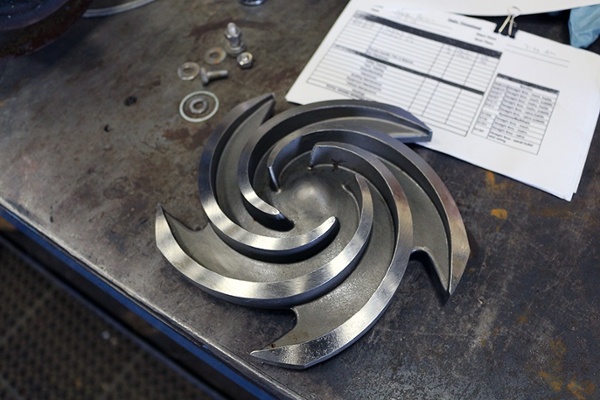
When pumping rags or solids, there are a few common impeller types to be familiar with. Understanding the differences in two vane, single vane, and vortex impellers will help you decide which is best for your ragging and solids issues. Let’s take a closer look at different styles of impellers and their best uses.
Before we dive in, it’s important to understand hydraulic efficiency. The concept is simple. Hydraulic efficiency is determined by how well a pump can convert supplied energy into useable output energy, or how well it converts the motor input power to fluid movement. If two “units” of energy are supplied to a pump and its output is only one “unit”, its efficiency is 50%.
A typical pump is never 100% efficient because energy is always lost in the conversion process. The energy is lost in two main forms: mechanical losses and volumetric losses. Mechanical losses include the energy lost to fluid friction and internal pump forces. Volumetric losses include the energy lost as the result of internal fluid leakage or slippage within the pump.
Still with me? Good. Let’s talk about different types of impellers.
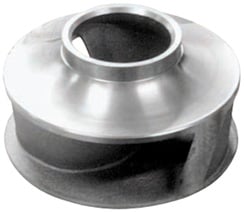 This design consists of a backing, or shroud, with vanes and a front shroud, creating enclosed channels for liquids to travel through. It is good for passing large solids and offers some of the best efficiencies of solids-handling impellers. The impeller maintains tight clearances with the wear rings, which keeps the inlet and pump pressures separate to reduce axial loads and maintain good efficiency. Single vane versions are great at passing solids, but sometimes two vane designs can get fibrous solids snagged as it has more leading edges to catch debris. If the pump does clog, it can be tricky to unclog because of the tight clearances and hard to reach channel spaces.
This design consists of a backing, or shroud, with vanes and a front shroud, creating enclosed channels for liquids to travel through. It is good for passing large solids and offers some of the best efficiencies of solids-handling impellers. The impeller maintains tight clearances with the wear rings, which keeps the inlet and pump pressures separate to reduce axial loads and maintain good efficiency. Single vane versions are great at passing solids, but sometimes two vane designs can get fibrous solids snagged as it has more leading edges to catch debris. If the pump does clog, it can be tricky to unclog because of the tight clearances and hard to reach channel spaces.
This impeller has a back shroud with vanes open to the incoming liquid. It permits solids to pump out easily, but it will wear as solids contact the vanes. With wear, the impeller clearances increase and slipping and recirculation occur, reducing the efficiency. It clogs less than an enclosed impeller, but can still get wrapped up at times. Luckily, it is easier to unclog than an enclosed impeller with its open-face design.
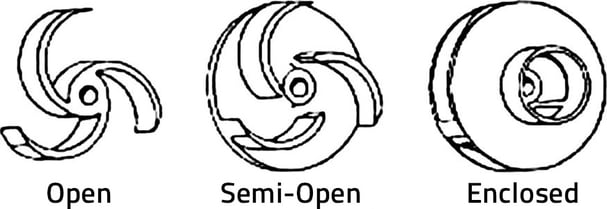
This design is similar to the semi-open impeller, but with more space in the volute. Its design creates a whirlpool, or vortex, as liquid comes in, keeping solids away from the impeller and moving them through the discharge. It is typically used in applications with trash and debris in the liquid, especially those with rags or stringy solids, making this impeller popular for sewage. The solids-handling ability of this impeller is one of the highest, but it makes its efficiency one of the lowest.
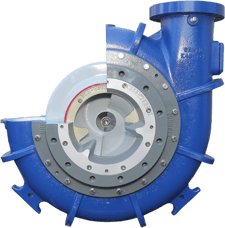 Chopper/Cutter Impeller
Chopper/Cutter ImpellerThe design typically incorporates hardened cutter bars that slice like scissors with the leading edges of the impeller vanes as they pass. A chopper pump is selected when the fluid has solids that need to be shredded to smaller pieces before they enter the pump. This helps prevent clogging and minimizes solid-related issues downstream. Its ability to handle solids is dependent upon the sharpness of the cutter bars so the ability decreases with wear. For efficiencies, it is on the lower end of the list.
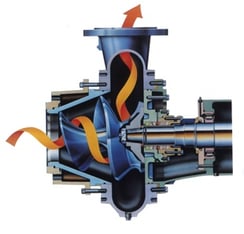 This impeller is used for pumping thick fluids and large, stringy solids. Its screw-like, open channel design allows for passing these solids while minimizing shear, making it excellent for sensitive fluids as well. It achieves high efficiency and is very resistant to clogging.
This impeller is used for pumping thick fluids and large, stringy solids. Its screw-like, open channel design allows for passing these solids while minimizing shear, making it excellent for sensitive fluids as well. It achieves high efficiency and is very resistant to clogging.
If you’re having problems pumping rags and solids, don’t hesitate to contact us. We’re happy to help any businesses in Wisconsin or Upper Michigan.
These Stories on Pumps
Headquarters and Service Center
Located outside Green Bay, WI
707 Ford Street
Kimberly, WI 54136
920-733-4425
OptiFlow Design and Build Center
1002 Truman Street
Kimberly, WI 54136
920-733-4425
Burnsville Service Center
12265 Nicollet Avenue
Burnsville, MN 55337
952-444-1949
Grand Rapids Service Center
26489 Industrial Blvd
Cohasset, MN 55721
952-444-1949
© Copyright 2024. Crane Engineering. All Rights Reserved. Privacy Policy.